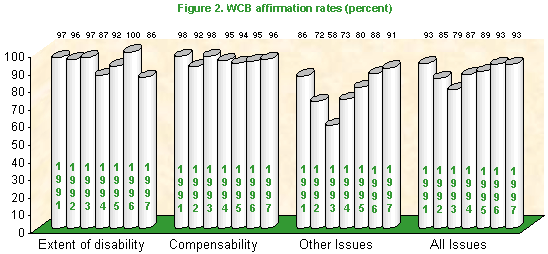
 Requests and Orders. In 1997 there were
224 appeals to the court on Workers’ Compensation Board
(WCB) decisions, over 25 percent fewer than in 1996. See Figure
1. The number of board orders on review dropped by about 26 percent
from 1996 to 1997. The appeal rate of orders on review has remained
constant over 1995-1997 at just over 21 percent.
Requests and Orders. In 1997 there were
224 appeals to the court on Workers’ Compensation Board
(WCB) decisions, over 25 percent fewer than in 1996. See Figure
1. The number of board orders on review dropped by about 26 percent
from 1996 to 1997. The appeal rate of orders on review has remained
constant over 1995-1997 at just over 21 percent.
|
Issues. The number and relative frequency of each issue are given in the table. Cases without one of the specified issues are counted as “other issues.” The relative frequency of extent of disability was typical of the past two years, but well below the 18.7% 10-year average. Compensability, on the other hand, had its highest relative frequency for that period. The most frequent other issues (including those in cases with a specified issue) were insurer penalty (17 cases), claimant attorney fees (13 cases), responsibility (12 cases), subjectivity (9 cases), claim bar/preclusion (7 cases), and jurisdiction (6 cases). |
|
Issue Disposition. Court dispositions and WCB affirmation rates are also given in the table. The court reversed the board in three temporary disability cases, one claim denial case, one aggravation case, two partial denial cases, and four other-issue cases. The WCB affirmation rate for extent of permanent disability was 100 percent, the rate for other issues was the highest of the past seven years, and the overall rate — 93.1 percent— equaled the 1996 rate which was the highest since 1991. See Figure 2. For the compensability cases, the acceptance rate after board review was 40 percent (38 of 95). After the four reversals by the court, the acceptance rate was an identical 40 percent. Other Data. The median time lag from appeal to order was 318 days (10.5 months), 30 days longer than in 1996 and the second-longest of the 1990s. The worker was the petitioner in 59.9 percent of the cases. SAIF was the insurer in 33.5 percent of the cases (includes multiple-insurer and non-complying employer). There were two disputes about permanent total disability (PTD awarded at some level); in each case the board reversed a PTD award. The court affirmed in one case, while the other was counted as a remand. In the only case involving attorney sanctions, the board declined to grant the employer-requested sanctions and the court affirmed without opinion.
DCBS Contested Cases. There were court decisions on nine contested cases in 1997, compared to three in 1996 (excludes dismissals and remands to the director to approve a stipulation). The most frequent issues were reimbursement for medically-related expenses, change of attending physician, and insurer penalty (two cases each). The court affirmed the director in all but one case. |
| DCBS Public Home Page | IMD Home Page | Site Search Engine |
If you have questions about the information contained in this
document please contact by e-mail or phone:
Russell Reed,
Research Analyst, Research & Analysis Section, Information
Management Division (503) 947-7343
This document was originally published in April 1998.
Document URL: http://www.cbs.state.or.us/external/imd/rasums/7_2340s.htm
[Printed form: 440-2340(4/98/IMD)]
In compliance with the Americans with Disabilities Act (ADA),
this publication is available in alternative formats by calling
(503) 378-8254 (V/TTY).
The information in IMD publications is in the public domain and
may be reprinted without permission.
 There were 160 court decisions
in 1997 (based on date of the slip opinion), 8.6 percent fewer
than the 175 decisions in 1996. This count excludes court
dismissals, one petition for attorney fees, and three orders
on reconsideration by the court. The count also excludes
22 remands, where the court did not (1) rule on the primary
issue, (2) direct a specific action of the board, (3) rule on
a major or precedent-setting sub-issue, nor (4) determine that
the board applied the wrong standard. The most common reasons
for remanding were recent law change, the board did not have
the benefit of a recent court decision, and a board finding was
in error (five cases each). Court decisions on Department of
Consumer and Business Services (DCBS) contested cases are also
excluded from these counts and analyses; they are addressed
in the final section of this report.
There were 160 court decisions
in 1997 (based on date of the slip opinion), 8.6 percent fewer
than the 175 decisions in 1996. This count excludes court
dismissals, one petition for attorney fees, and three orders
on reconsideration by the court. The count also excludes
22 remands, where the court did not (1) rule on the primary
issue, (2) direct a specific action of the board, (3) rule on
a major or precedent-setting sub-issue, nor (4) determine that
the board applied the wrong standard. The most common reasons
for remanding were recent law change, the board did not have
the benefit of a recent court decision, and a board finding was
in error (five cases each). Court decisions on Department of
Consumer and Business Services (DCBS) contested cases are also
excluded from these counts and analyses; they are addressed
in the final section of this report.